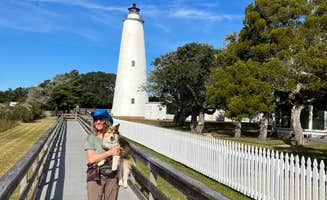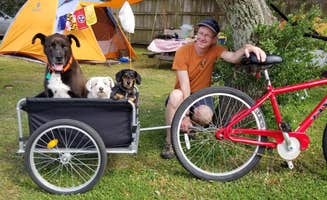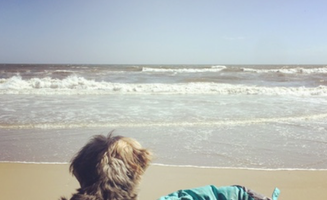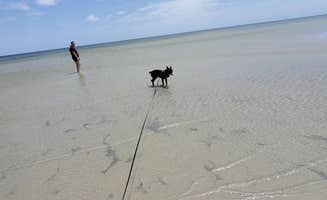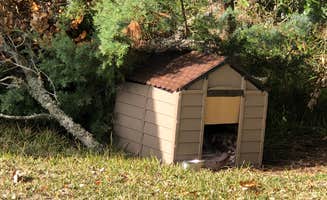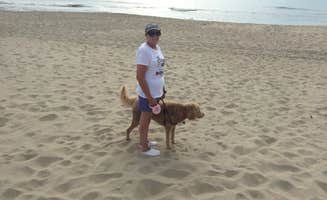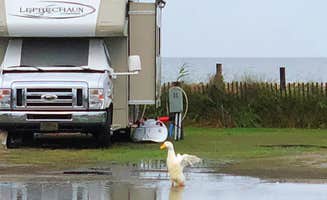Cape Lookout National Seashore stretches along 56 miles of undeveloped barrier islands off the coast of North Carolina. Most campgrounds in this region have direct beach access with sites positioned either behind protective dunes or along the Pamlico Sound. Average summer temperatures reach 85°F with high humidity, while winter camping sees milder 50-60°F days. Wind is a constant factor year-round, creating both cooling relief during summer months and challenging tent conditions.
What to do
Beach driving with permits: Cape Point Campground provides easy access to designated ORV (Off-Road Vehicle) beach areas. "If you need a permit to drive your 4wd vehicle on the beach, there is a beach access ramp right next to the ranger station," notes Melissa W. about nearby Frisco Campground.
Lighthouse tours: Climb historic lighthouses throughout the Outer Banks. "The area is amazing. The drive down Highway 12 is like no other. Be sure to check out the lighthouse and make reservations in advance, especially during peak seasons," advises Bran P. from Cape Point Campground.
Water sports: The Pamlico Sound offers protected waters for beginners. "Shallow water for play, fishing, and water sport. Beautiful sunsets," reports Janet G. about her stay at Frisco Woods Campground.
Sunrise viewing: Early morning beach walks reward with solitude and colors. "We woke up at 5:30 to watch the sunrise over the ocean which was just a hop, skip and jump away from our tent. It was paradise," shares Rachel M. from Ocracoke Campground.
What campers like
Sound-side sites: Waterfront campsites provide constant breezes and stunning views. "Our campsite was just feet from the shore of the Pamlico Sound. Beautiful sunsets. Shallow water for play, fishing, and water sport," reports Janet G. about Frisco Woods Campground.
Premium perimeter sites: Select outer loop sites for better spacing and views. "I had a wonderful late November five night, tent camping, surf fishing week at a wonderful, clean, quiet campground. I stayed in site D-17 and recommend any of those sites on the outer perimeter of D loop," shares Brandon M. from Ocracoke Campground.
Nighttime stargazing: Limited light pollution creates exceptional astronomy opportunities. "The night sky is breathtaking. The beach is usually pretty quiet, more fishermen than anything else," notes Melanie P. when describing her experience at Frisco Campground.
Walkable town access: Some campgrounds offer direct access to village amenities. "I absolutely love Ocracoke and Teeter's is the only campground with power and hot showers. The owner is super nice and prices are reasonable. You can walk everywhere you need to go," shares Ashley M. about Teeter's Campground.
What you should know
Weather challenges: Rapid changes in conditions occur frequently. "It's a true adventure coming into this island on a ferry and then camping in sand," explains Sarah F. from Teeter's Campground.
Limited hookups: National Park Service campgrounds offer fewer amenities than private options. "This is a park with no power or shade. Bath houses are adequate," states Cathy L. from Ocracoke Campground.
Seasonal operations: Most campgrounds close during winter months. "Open: Mar 1- Dec 1 Rates: 42.00 - $2,025.00," notes a reviewer from Frisco Woods Campground.
Site terrain variations: Expect varied camping surfaces from gravel to grass to sand. "The sites on the hill have a breeze and view of the ocean. The ORV just outside the campground makes beach access easy," explains Roxanne R. from Hatteras Sands Campground.
Tips for camping with families
Off-season advantages: Consider spring or fall visits for fewer crowds and bugs. "If you can't find a spot in one of the boutique or smaller national seashore locations you won't get skunked. You'll defiantly find a spot here even in crowded summer weekends when the outerbanks are packed," advises Kayko S. about Cape Point Campground.
Pool options: Private campgrounds offer swimming alternatives to ocean waves. "The pool area is really nice. Several laundry places and the shower facility was spotless," reports Matt T. about Cape Hatteras KOA.
Kid-friendly recreation: Look for campgrounds with specialized activities. "We've stayed here for over 15 years in tents, then eventually worked our way up to the cabins. The proximity to the beach is great. There are no roads to cross so the campground is oceanfront. The pool is really nice and my wife and I feel comfortable with the kids riding their bikes all over the facility," shares Steve C. about Cape Hatteras KOA.
Tent site selection: Choose sites based on shade availability and ground cover. "Sites along the back side of the perimeter loop have a view of the ocean while sites on the front side of the perimeter loop are closer to the boardwalks leading to the beaches," advises Melissa W. about Frisco Campground.
Tips from RVers
Site length limitations: Check site dimensions before booking larger rigs. "The sites are definitely wide and deep enough for the biggest and baddest of rigs. We stayed here over Memorial Day weekend and the place was packed...but somehow the facilities did not look like they had been through World War-3," notes Eric R. about Cape Hatteras KOA.
Utility access planning: Water and electric hookup availability varies widely. "Black water Hook ups are on every other row. Cancellation policy is strict so place accordingly," warns Matt T. about Cape Hatteras KOA.
Weather preparation: Wind protection is essential for awnings and outdoor gear. "They do have tent only areas that's not something that national or state parks do on the west coast. It's nice so that you don't get stuck in between two generators when you are trying to get back to nature in the outdoors," mentions Kayko S. about Cape Point Campground.



